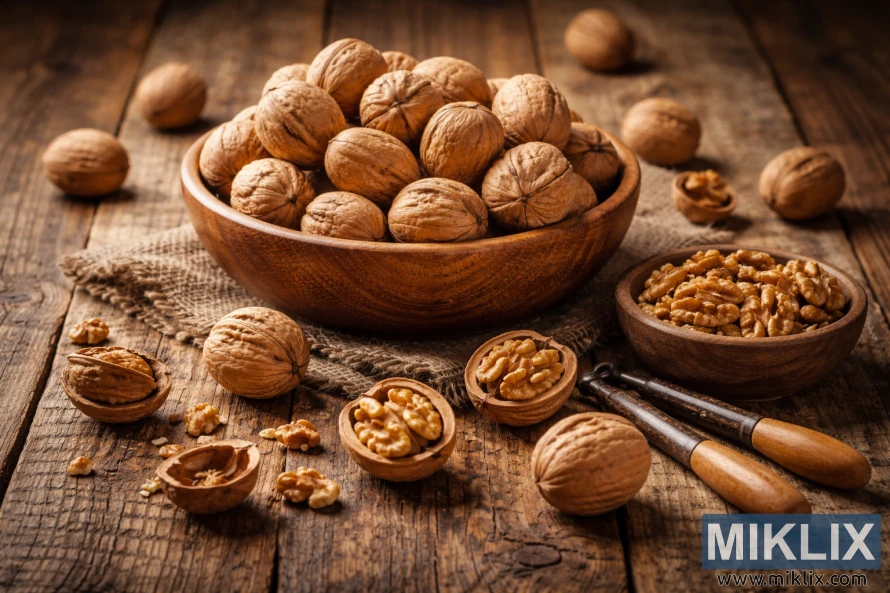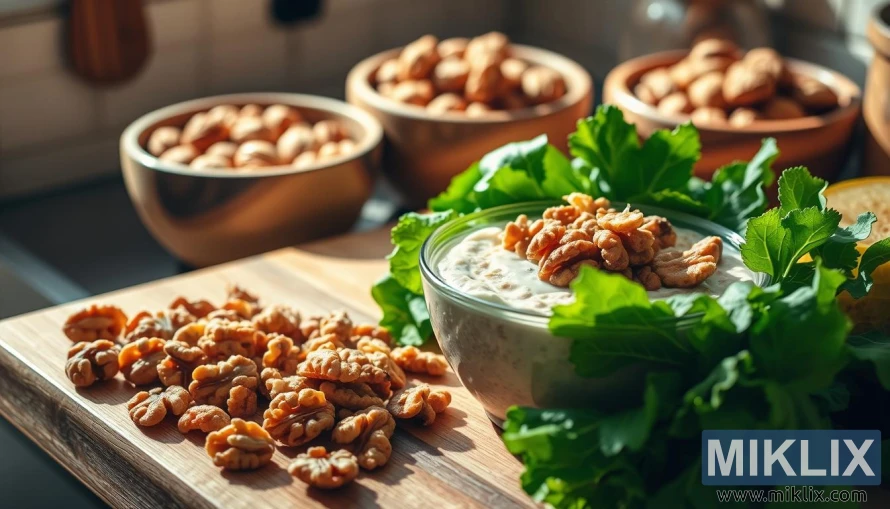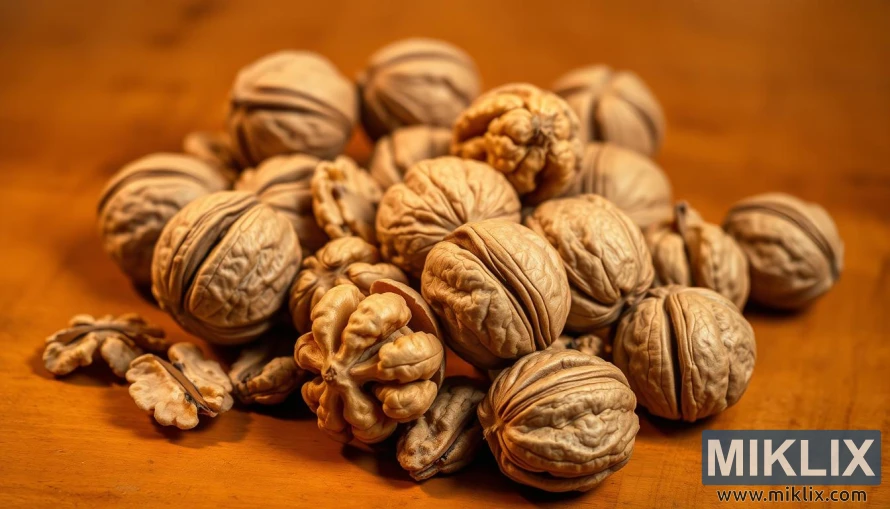Brain Food and Beyond: The Surprising Benefits of Walnuts
Published: May 12, 2025 at 7:49:06 PM UTC
Last updated: December 26, 2025 at 11:26:32 AM UTC
Walnuts are not just tasty; they're also packed with health benefits. They're full of omega-3 fatty acids, fiber, vitamins, and antioxidants. These nutrients make walnuts a great choice for a healthy diet. Studies show that walnuts are good for your heart and brain. They also help reduce inflammation. Nutrition experts say walnuts should be part of your daily meals. It's clear that walnuts offer many benefits.

Key Takeaways
- Walnuts are a rich source of omega-3 fatty acids.
- They support heart health and cognitive function.
- Walnuts can help reduce inflammation in the body.
- Incorporating walnuts into your diet can improve your overall nutrition.
- Nutrition experts recommend adding walnuts to daily meals.
Nutritional Profile of Walnuts
Walnuts are a nutritional powerhouse, making them great for any diet. A 1-ounce serving has about 190 calories. This shows they are rich in calories.
They contain around 18 grams of good fats, mostly unsaturated fats. These fats are good for your heart. Walnuts are also full of omega-3 fatty acids, like alpha-linolenic acid (ALA). This is good for your heart too.
Walnuts also have about 4 grams of protein and 2 grams of fiber. This helps with muscle and digestion. They are full of important vitamins and minerals like iron and magnesium. These help your body work well.
Studies show walnuts have strong antioxidant properties. They have more antioxidants than many other nuts. This is thanks to vitamins like vitamin E and polyphenols in their skin.
Heart Health Benefits
Walnuts are known for their heart health benefits. They are rich in alpha-linolenic acid (ALA). This can help lower LDL cholesterol, which is bad for the heart.
Studies show that eating walnuts daily can lower total cholesterol and triglycerides. This is good for your heart.
Walnuts are great for a heart-healthy diet, like the Mediterranean diet. They have antioxidants and anti-inflammatory effects. These help lower heart disease risk and improve blood vessel function.
Walnuts also have omega-3 benefits, which are good for the heart. Adding walnuts to your diet is a key step to better heart health.
Anti-Inflammatory Properties
Walnuts are known for their strong anti-inflammatory effects. This is thanks to their high levels of polyphenols, like ellagitannins. These compounds help fight oxidative stress, which is linked to many chronic diseases.
Studies show that eating walnuts can greatly reduce inflammation. This is good for your health. The antioxidants in walnuts protect the body from oxidative stress. Adding walnuts to your diet can help lower disease risks and improve your overall health.
Walnuts and Gut Health
Walnuts are getting more attention for their benefits to gut health. Studies show they help balance the good bacteria in our digestive system. Eating walnuts regularly can make our gut environment healthier.
A clinical trial found that walnuts in the diet changed gut bacteria for the better. This change led to better digestion, less inflammation, and overall health improvement. The omega-3 fatty acids and fiber in walnuts play a big role in these benefits.

Weight Management Support with Walnuts
Walnuts are great for those trying to manage their weight. They have healthy fats and fiber that help control hunger. This makes them a good snack choice.
Studies show that eating walnuts can make you feel full longer. For example, a study found that people who had walnut smoothies felt less hungry than those without walnuts. This shows walnuts can help reduce snacking and support weight goals.
Walnuts also add flavor and health benefits to meals. You can sprinkle them on salads, blend them into smoothies, or snack on them alone. They're a simple and nutritious way to help with weight management.
Walnuts and Type 2 Diabetes
Adding walnuts to your diet can help manage blood sugar, which is key for type 2 diabetes. They can aid in weight control, which is important for diabetes management. Walnuts are packed with good fats, fiber, and antioxidants, boosting overall health.
Research shows walnuts can slightly improve blood sugar levels. This makes them great for those trying to control glucose. Eating walnuts can also make your diet more varied and support better health for type 2 diabetes.
Blood Pressure Regulation Through Walnuts
Walnuts are key in managing blood pressure, mainly for those with high blood pressure. Studies show that adding walnuts to your diet can lower blood pressure. This is great for people who follow a Mediterranean diet, which often includes nuts.
The Mediterranean diet focuses on whole foods and healthy fats. It's a great choice for heart health. Eating walnuts as part of this diet can help control blood pressure. This is important because it reduces the risk of heart disease.
Benefits of Walnuts for Brain Health
Walnuts are great for brain health because they're full of omega-3 fatty acids and antioxidants. These nutrients help protect brain cells from damage. Studies show that eating walnuts can improve memory and make thinking faster.
Eating walnuts every day can be a fun and healthy choice. The antioxidants in walnuts help keep the brain sharp as we age. More research backs up how good walnuts are for our brains.

Adding walnuts to your diet is a smart move for your brain. They're not just tasty; they're also good for keeping your mind sharp. So, walnuts are a great choice for anyone wanting to stay mentally sharp as they get older.
Walnuts and Healthy Aging
Adding walnuts to your diet is a smart move for healthy aging. Studies show that these nuts are key in boosting physical health in older adults. Eating walnuts can help prevent physical decline, keeping you mobile and independent as you get older.
Walnuts are packed with good fats, antioxidants, and vitamins. These nutrients boost energy, which is essential for staying active. They also support longevity by encouraging physical activities that benefit both mind and body.
Overall, eating walnuts is linked to healthy aging. People who eat them often feel better and have more energy in their later years.
Reproductive Health and Sperm Function
Walnuts can help improve reproductive health and sperm function. Studies show that walnuts' antioxidants and nutrients may protect sperm membranes. This could help men's fertility.
Adding walnuts to your diet is a tasty way to support fertility. Here are some reasons to try them:
- Rich in omega-3 fatty acids which support overall reproductive health.
- Contain antioxidants that protect sperm from oxidative stress.
- Promote healthy blood flow, which can influence sperm function positively.
More research is needed to confirm walnuts' benefits. But early studies suggest they might help reproductive health. Eating walnuts daily could offer many benefits for fertility.
Reduction of Blood Fat Levels with Walnuts
Walnuts are getting more attention for their health benefits. They can help lower cholesterol and triglycerides. This is good for your heart health.
A study showed that eating 1.5 ounces of walnuts a day can lower total and LDL cholesterol. This change is great for your heart.
Adding walnuts to your meals can be tasty and healthy. Try them in salads, yogurt, or as a snack. It's a simple way to improve your cholesterol and triglyceride levels.
How to Incorporate Walnuts into Your Diet
Adding walnuts to your meals can be fun and healthy. They make a great snack, with a crunchy texture and rich taste. They also add a nice touch to salads, making them more enjoyable.
Start your day with walnuts on oatmeal or yogurt for extra nutrition. Mixing them into smoothies gives a creamy feel and boosts nutrition. Baking enthusiasts can use walnuts in muffins, breads, or cookies for a healthier twist.
Homemade trail mixes are another great way to enjoy walnuts. Mix them with dried fruits and other nuts for a tasty snack. You can also sprinkle walnuts on pasta dishes or grain bowls for extra flavor and healthy fats.
Don't forget to keep your portion sizes in check! Aim for about 1 ounce, or 12-14 walnut halves, each day. Try different ways to include walnuts in your meals and snacks for a healthier diet.

Harvesting and Sustainability of Walnuts
Walnuts are a big deal in U.S. agriculture, with California leading the way. It supplies 99% of the country's walnuts. The state's walnut farming shows a strong focus on being green. Farmers use eco-friendly methods to keep production high and the environment safe.
Sustainable walnut farming includes several important steps:
- Using fewer chemicals to protect nature.
- Conserving water to avoid wasting it.
- Encouraging biodiversity to keep ecosystems healthy.
These green practices make walnuts healthier and more appealing to buyers. They also help the planet. By farming responsibly, walnut growers meet the need for healthy food while caring for the Earth.
Where to Buy Walnuts
Buying walnuts is easy and fun. Most grocery stores have many options for different tastes. When you go to your local store, check these places:
- Baking Aisle: Find raw walnuts here, great for baking or salads.
- Snack Aisle: Roasted walnuts are here, perfect for a quick snack.
- Health Food Section: Specialty stores have walnut oil and more, for extra nutrition.
With these choices, adding walnuts to your meals is simple. You can pick the right type for your recipes. Make sure to compare prices and types to get the best taste and health benefits.
Recommendations for Daily Walnut Intake
Health experts suggest eating about 1 to 2 ounces of walnuts daily. This is roughly 30-60 grams or 1/4 to 1/2 cup. This amount is great for your heart and overall health.
It's easy to add walnuts to your diet. You can put them in salads, oatmeal, or just snack on them. Following these guidelines can boost your health.
Potential Downsides of Walnuts
Walnuts are good for your health, but there are some downsides to know. They have a lot of calories, so eating them in small amounts is important. This helps you enjoy their benefits without gaining too much weight.
Allergies are another thing to think about. Some people can have serious allergic reactions to walnuts. These reactions can be mild, like itching, or severe, affecting breathing. If you're allergic or have dietary restrictions, talk to a doctor.
Adding walnuts to your diet needs careful thought. You should weigh their health benefits against the possible risks. This way, you can enjoy them safely and get the most out of them.
Conclusion
Adding walnuts to your meals can greatly boost your health. They are packed with nutrients and offer many benefits. These nuts are not only delicious but also good for your heart, brain, and weight.
Studies keep showing how walnuts are good for us. They help in many ways, making them a great choice for a healthy diet. Including walnuts in your meals can lead to better health.
Choosing walnuts is more than just a food choice. It's a move towards a healthier life. You can enjoy them on their own, in salads, or as a snack. Walnuts are a great option for anyone wanting to eat better and feel better.

Further Reading
If you enjoyed this post, you may also like these suggestions:
- L-Tartrate Unveiled: How This Under-the-Radar Supplement Fuels Energy, Recovery and Metabolic Health
- Gobble Up Good Health: Why Turkey is a Super Meat
- From Muscle Fuel to Immune Boost: The Surprising Benefits of Whey Protein Explained
